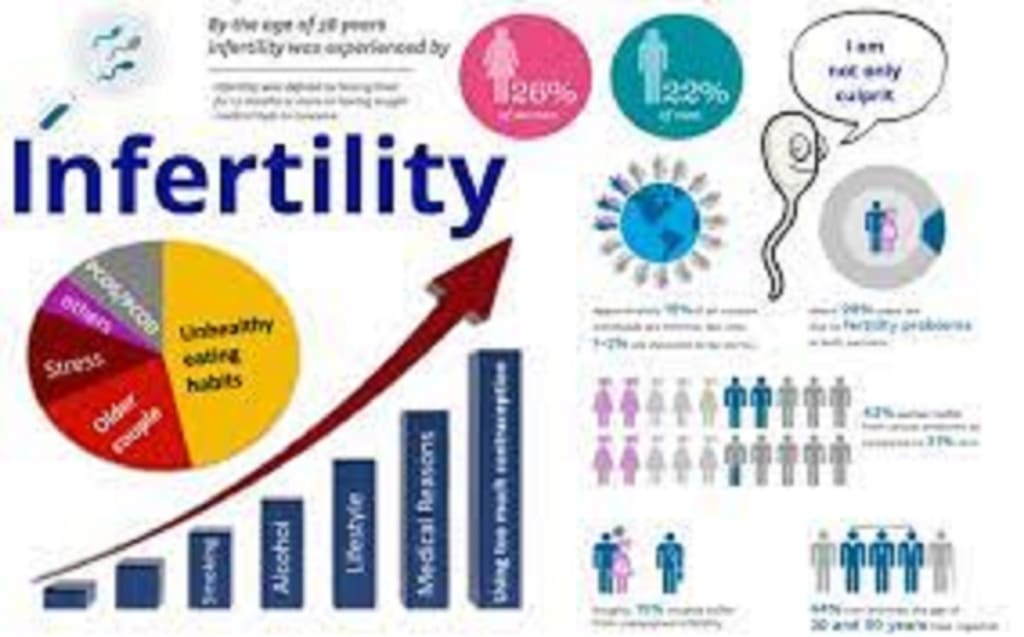Fertility of Men and Women
Stage of Fertility of Men and Women

Bachelor Male and female Consult only.
Fertility is a complex biological process that involves many factors, both physiological and environmental. While some couples may be able to conceive without any issues, others may struggle with infertility. According to the World Health Organization (WHO), infertility affects approximately 15% of couples worldwide. In this article, we will discuss five things that affect male and female fertility.
Age
Age is one of the most significant factors that affect fertility. As women age, the quality and quantity of their eggs decrease, which makes it harder for them to conceive. Women are born with a finite number of eggs and their ovarian reserve declines over time. By the age of 35, a woman's fertility starts to decline, and by the age of 40, her chances of getting pregnant are less than 5% per cycle. Men also experience a decline in fertility as they age, although it tends to happen at a slower rate than in women.
Lifestyle factors
Lifestyle factors such as diet, exercise, and substance use can affect fertility in both men and women. Obesity, for example, has been linked to decreased fertility in both sexes. Women who are obese are more likely to have irregular menstrual cycles, which can make it harder for them to conceive. Men who are obese may have lower sperm counts and decreased sperm motility.
Smoking and alcohol consumption can also hurt fertility. Women who smoke have a higher risk of infertility, miscarriage, and premature delivery. Men who smoke have lower sperm counts and decreased sperm motility. Heavy alcohol consumption can also affect fertility in both men and women. In men, alcohol can decrease testosterone levels and impair sperm production. In women, alcohol can disrupt hormone levels and affect ovulation.
Medical conditions
Certain medical conditions can affect fertility in both men and women. Polycystic ovary syndrome (PCOS) is a common hormonal disorder that affects women of reproductive age. Women with PCOS often have irregular menstrual cycles, which can make it harder for them to conceive. They may also have high levels of male hormones, which can interfere with ovulation.
Endometriosis is another condition that can affect female fertility. It occurs when tissue that normally lines the uterus grows outside of it, causing pain and inflammation. Endometriosis can cause scarring and adhesions, which can interfere with ovulation and implantation.
In men, conditions such as varicose (enlarged veins in the testicles) and erectile dysfunction can affect fertility. Varicose can cause decreased sperm production and motility, while erectile dysfunction can make it difficult for men to achieve or maintain an erection.
Environmental factors
Environmental factors such as exposure to toxins and pollutants can also affect fertility. For example, exposure to lead, pesticides, and other chemicals can decrease sperm count and motility in men. Women who are exposed to high levels of lead, pesticides, and other chemicals may have a higher risk of miscarriage and stillbirth.
Exposure to high levels of heat can also affect male fertility. Men who work in jobs that require them to sit for long periods or wear tight clothing may be at higher risk for decreased sperm production and motility.
Genetics
Genetic factors can also play a role in fertility. Some genetic disorders can cause infertility or make it harder for couples to conceive. For example, Turner syndrome, a condition that affects women, is caused by a missing or incomplete X chromosome. Women with Turner syndrome may have infertility due to ovarian failure.
Other genetic disorders that can affect fertility include Klinefelter syndrome, Y chromosome deletions, and cystic fibrosis. In some cases, genetic testing may be recommended for couples who are having trouble conceiving.
In conclusion, fertility is a complex process that can be affected by a wide range of factors. Fertility refers to the ability of an individual to conceive a child and carry the pregnancy to term.
Several factors can influence fertility, including age, genetics, hormonal imbalances, lifestyle choices, medical conditions, and environmental factors. For example, as a woman ages, the quality and quantity of her eggs decrease, making it more difficult for her to conceive. Certain medical conditions such as polycystic ovary syndrome (PCOS) and endometriosis can also affect fertility.
Lifestyle factors such as smoking, excessive alcohol consumption, and obesity can also impact fertility. Exposure to environmental toxins such as pesticides and chemicals can also affect fertility in both men and women.
Overall, fertility is a complex and multifaceted process that can be affected by a wide range of factors. If you are having difficulty conceiving, it is recommended that you seek the advice of a fertility specialist or medical professional who can help identify any underlying issues and recommend appropriate treatment options.
About the Creator
Sumera Saeed
I am a professional article writer since 2015. The best topic in my field is Food, Beauty, Business, and health. You can also request on my E-mail address which is given on my site.
Enjoyed the story? Support the Creator.
Subscribe for free to receive all their stories in your feed. You could also pledge your support or give them a one-off tip, letting them know you appreciate their work.





Comments
There are no comments for this story
Be the first to respond and start the conversation.